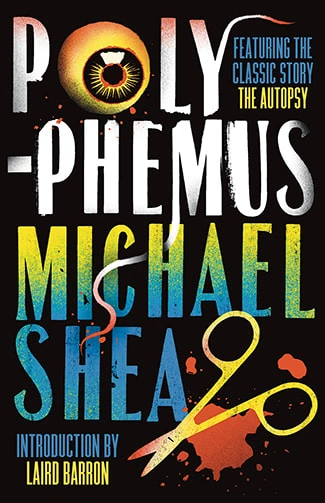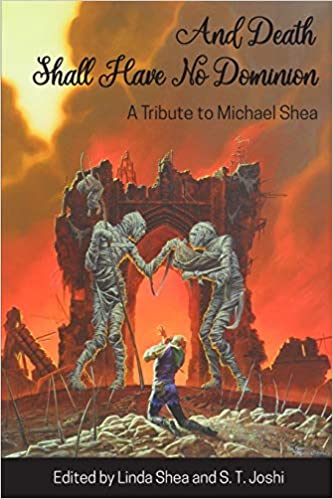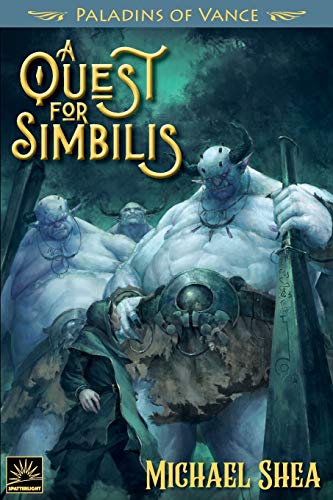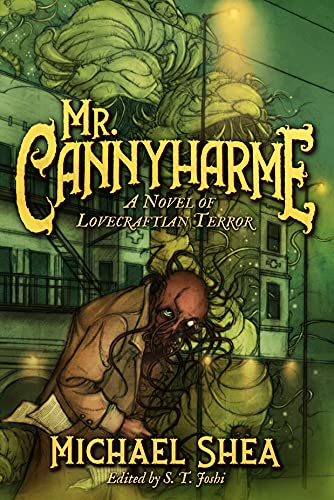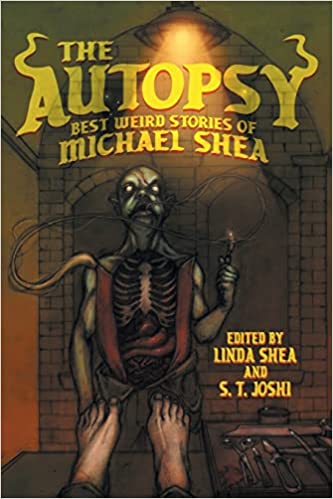news
Memories of Michael Shea by Marc Laidlaw
by admin on Apr.02, 2014, under news, Tributes

Marc Laidlaw
In the summer of 1988, near the end of a cross-country drive that would culminate with Michael throwing his typewriter into a deep Maine lake, the Sheas, Michael and Linda, stayed overnight with us on Long Island. The summer rain was torrential but sporadic, so that we had plenty of time to sit in the yard sweltering and tending to the barbecue. Michael carried with him on this journey a large box of signature pages for a limited edition anthology—a collection that had already been signed by a number of other authors and now required only Michael’s signature in order to be bound.
Michael, as was often the case, had yet to be paid for his contribution to the book, and that was among the subjects of his endlessly soaring flights of spontaneous poetry and wordplay. When he spoke, it was hard to see what tethered him to earth. His sentences were like balloons full of noble gases, going aloft and pulling him with them. It didn’t matter what the subject was, he sent them off in flights that left other writers dazzled by their deftness. If you have read his lush, fantastic prose, you might just possibly be able to imagine him speaking; yet the fact that these were not sentences laboriously composed, but extemporized, made listening to him a differently dazzling experience than reading him.
Eventually we retreated into the house, and into the night.
The rains returned.
I rose in the morning and padded past the slumbering Sheas on our sofabed, glanced out the window, and gasped. In the middle of the patio table, in a puddle of standing water, stood the box of signature pages Michael had carried from California.
I woke him, and he went outside with a grim look, cursing under his breath. Opening the box, he discovered that only a few pages on the top and bottom had been damaged. Almost instantly he devised a ghoulish plan. He would send the publisher waterlogged pages one at a time, with a renewed demand for payment: “If you ever want to see your precious pages again….”
We laughed harder then than we had the night before, but his was the sardonic humor of one who had missed meals due to missing payments. The adulation of fans, the respect and admiration of his so-called peers (the word “peer” used strictly in the social sense, not that of artistic equivalence), even the awards, none of these translated into commercial success. In fairness, it rarely does. But did this stop him? No. I think sometimes it staggered him however.
Michael was a writer whose stories travelled by word of mouth, by reputation. In 1979, home from college that summer, my best friend called to tell me about a story he had read in the latest F&SF. From his brief description alone, I received chills. It was Michael’s early classic, “The Angel of Death,” which worked fantastic changes on the topical Summer of Sam that had obsessed a culture. We sensed instantly the arrival of a master. Several years later, at a gathering of writers and fans, someone mentioned in similarly breathless tones a new tale by Shea: “The Autopsy.” It was the sort of gathering where I could quickly lay hands on a copy of F&SF and scurry to a corner to gulp it down; it is not always obvious that a classic has been delivered. In this instance, it was obvious.
Not long after that, I first met Michael and his wife Linda. A steely, unpretentious man, he kept his intelligence hooded like a lantern until he felt he was in trustworthy company; he was as mordantly dark as Linda was golden and bright. We spoke of horror, of course. A series of barrel murders in Golden Gate Park was headline news. To these Michael added a supernatural flourish—a shape shifting creature identifiable only by a shackle and chain it could not alter, no matter its form.
Through the years, I met my own wife and as a couple we grew closer to the Sheas. They took their small kids and bailed out of San Francisco, which played too harsh a tune on Michael’s strings, and took up various residences in the wine country. Michael still drank then—when I first met him, a bottle of peppermint schnapps was his bosom buddy–but a temporarily crippling and all but fatal collision with a semi finally convinced him to put an end to that. Such eye-to-eyes with death, in addition to the spark and energy of his young children, seemed to drive him to a firmer embrace of life. He became a dedicated runner. Whenever we visited, he was always up early for his miles of running, looking faintly weatherbeaten in his shredded T-shirts and ragged sneakers. I remember his laughter like sand and smoke. He worked hard, and so little of it was at writing—painting houses, spreading asphalt, carpentry. We moved far and saw the Sheas infrequently, much to our sadness. I knew that little by little, Michael had eked his way to a degree and begun to teach. All these occupations surely fed his fiction and his poetry, byt it’s hard not to resent them, as they took him away from the one thing he could leave us.
The irony is that no one wrote more richly or beautifully of the physical aspects of death. No other theme brought out such voluptuous verbosity. I know that he had stared death full in the face several times in his life. This alone does not make him remarkable. But it was Michael’s special grace to wrest incredible beauty from these trysts with mortality, without losing sight of their gruesome nature. It seems fitting that he will be remembered for some of the most beautifully morbid passages ever penned.
Somewhere, in a rare collectible edition, you may find Michael’s signature on a page inexplicably warped and waterlogged. He never followed through on his ransom demand, but I hope all the same he was paid, and well, by whoever was lucky enough to have a new Shea story. We owe him a great deal more than that sum for the priceless visions he brought into being, from the rich landscape of his imagination, wherein he now entirely resides.
Dark Star: The Michael Shea Experience
by admin on Mar.29, 2014, under news, Tributes
by Laird Barron
I first stumbled across Michael Shea in the latter 1980s when I read his terrifying novella, “The Autopsy,” in Hartwell’s seminal anthology series The Dark Descent. Though too callow to understand the depth of what I’d encountered, I steadily and inexorably pursued Shea’s fiction over the years, recognizing in it a kind of cynosure of the modern weird tale: a dark star shining at the heart of the matter. Not so long ago, I wrote an essay regarding the current state of the horror genre for the venerable LOCUS MAGAZINE. I said of “The Autopsy,”
“Shea’s dark masterwork remains etched upon my sensibilities as the ultimate example of how a storyteller may capture our wildest, bleakest, most fearful imaginings and bend them to the service of something far greater than an impulse toward the coarse and coarsely visceral.”
Much the same could be said of the caliber of his oeuvre on the whole. Too easily one might be captivated by the visceral elements of Shea’s writing, its panoply of the grotesque, the baroque, and the erotic, missing the subtle textures and flourishes, the fact his pieces are layered tight as folded steel and sharp to the touch.
Shea demonstrates an unnerving facility for the macabre, the cerebral, the whimsical, and possesses the deceptively effortless ability to conjure scenes of horror and dread leavened by sly, acerbic humor. This prevalent undercurrent of humor unifies the frequently mercurial nature of his prose, its essential moodiness, and serves to accentuate set pieces and amplify and reinforce his themes in a manner analogous to orchestral accompaniment in cinema.
He employs absurdity and satire like weapons — behold the cynical protagonist of “The Extra,” and the nightmarish dystopia he calls home. Seldom have I encountered a more brutal indictment of corporate America, and sunny Hollywood in particular; an indictment all the more devastating due to its wry, jocular delivery, a recurring hallmark of Shea’s fiction.
Before writing this introduction, I perforce revisited Polyphemus and The Incompleat Nifft among other assorted tomes, much of which comprise The Autopsy & Other Tales. Thoughts of my impending task flew out the window as I was instantly drawn once again into Michael Shea’s realms of the dark fantastic. It is a testament to the man’s power, his storyteller’s guile, that I was immediately restored to the youth who’d been weaned upon Edgar Rice Burroughs, Robert E. Howard and Louis L’Amour. Without question Michael Shea is the contemporary analogue of these authors. It is apparent upon tracing Shea’s career back to his 1974 debut novel A Quest for Simbilis that his original creative influences also hinged mightily on the likes of Jack Vance, Fritz Leiber, and, as his career has progressed, Michael Moorcock and H.P. Lovecraft; four looming figures of the Western canon of the fantastic. Fantasy author Marc Laidlaw has called Shea’s prose “sinewy” and Algis Budrys made incisive reference to “the characteristic Shea touch of the grisly.” I would add “lyrical” as an alloy to those qualities that are fundamentally Shea’s. His work reflects the sensibilities of a poet — Robert Creely and Langston Hughes are singing in the spaces and the gaps. These harmonies create an astonishing effect juxtaposed and intertwined as they are with Shea’s gothic styling.
Shea’s prominence as an author, the motive force behind his enduring appeal, is a quality of versatility common to the most gifted of writers. Thankfully, this remarkable versatility in no way compromises the unique character of his voice. Indeed, Shea’s capacity as a visionary storyteller is augmented by the strength of his voice. That voice is a dynamic and singular force and unmistakable no matter where his literary fascinations might lead him. Where one finds a certain playfulness of language, a devil-may-care abandon in the Nifft tales, there is nothing at all amusing about the stark, cerebral, indeed clinical, narrative machinery ticking away in “The Autopsy.”
From his original authorized sequel to Vance’s Eyes of the Overworld; and unique science fiction horror smashups such as “The Angel of Death,” and “The Horror on the #33,” to the rollicking black fantasy saga of “Nifft the Lean,” these works are indelibly “Shea.” Here are stories one sets aside with a sense of melancholy, that bittersweet combination of satisfaction and regret engendered by the finest literature. To delve into Michael Shea’s world is to become embroiled in the perils and exploits of his characters: a rogues’ gallery of swashbuckling thieves, diabolical killers, quantum anthropologists, heroic doctors, and darksome intelligences from beyond the veil of Man’s tiny smudge on the galactic map. Indeed, to partake of the Shea experience is to be smitten by the profundity of imagination on display. One doesn’t want the ride to end, the door to close, the curtain to fall.
Our post 1970s world has been transfigured by magnitudes of social and technological evolution. Consequently, the field has exploded with a tidal wave of new ideas and approaches. The literary landscape has been continually, and often dramatically, reshaped in reaction to these forces. The science fiction and fantasy fields have seen the meteoric rise of epic high fantasy, cyberpunk, so-called splatter and the enigmatic genre known as slipstream, among scores of others. Since Shea emerged upon the scene speculative fiction has mutated and evolved at a relentless pace. Nonetheless, works such as “Polyphemus” and “The Extra” remain as relevant today as they have ever been. Continued attention from publishers, critics and awards juries strongly suggest that his relevance will persist in the decades to come.
Twenty years gone, in his introduction to the landmark collection Polyphemus, Algis Budrys called Michael Shea “an ornament to the field.” I can’t say it any better than Budrys, except to add my footnote: Shea has proceeded from ornament to star.
Now it’s time for me to step aside and let this dark star shine.
January, 2008 Olympia, WA
Lovecraft eZine Video Tribute
by admin on Mar.27, 2014, under news, Tributes
Mike Davis and his Lovecraft Ezine have invited several authors to participate in a video discussion of Michael’s Mythos work.
Blackgate Magazine Tribute: The Books of Michael Shea
by admin on Mar.26, 2014, under news, reviews
Blackgate is paying tribute to the novels of Michael Shea.
Editor John ONeill by writing about a different novel each week.
Michael Shea, 1946 – 2014
by admin on Mar.07, 2014, under news, Tributes
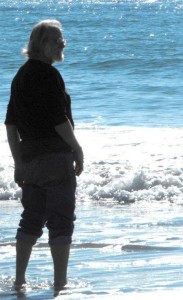
Michael Shea at Point Reyes, CA, January 2014
It is with great sadness that our family must tell Michael’s readers of his passing. It happened very suddenly on Sunday, February 16th and remains a great shock to us all.
The depth of this loss is vast and multi-fold. He touched so many as a writer, as a English teacher, and as an immaculately honest and kind man. For those lucky enough to have known Michael, he radiated enthusiasm, wit, and laughter. A self-proclaimed “hyperbolicker,” his awe of the universe so naturally shone forth through his love of language. He was conversant in Spanish, French, and German but loved and respected English most of all. Without effort and at the drop of a hat, he’d recite full poems from Thomas, Eliot, Swinburne, and Shakespeare, his favorite. A wordsmith himself, Michael could not help but relish and convey the music of the words he read or recited.
Michael published his first novel, A Quest for Simbilis, in 1974, and for all the years that I knew him, he wrote almost every day. Novels, short stories, and, his first love, poetry poured out of him up through the very last day of his life. Some thought of Michael as reclusive, when in fact he was just old-fashioned, a writer’s writer. Once a piece was perfect, he wanted to set it aside, forget it, and begin the next project. Even so, we, his family, feel that, along with our memories, his written works are what we still have of him. In this spirit, this space will soon change into a Michael Shea Forum, a place where people can share their experiences, both literary and personal, as well as find access to new releases and formats of his work– Mythos, fantasy, sci fi, and horror– in print and electronic formats.
Michael was a loving father of two, and my husband and best friend for thirty five years. We will miss his gentle spirit and the window to the world that this generous man held open so widely for us all.
Please feel free to share by posting a comment, we would love to hear from you. And if you would like to send a private communication to his family, please use the contact page here.
This small bit of verse comes from Michael:
Where wild winds shepherd their cloudy kine,
Where lightnings unborn sleep sheathed in the blue,
That’s the bright country that I will call mine,
And where I would do what the winged one’s do!
–(The Mines of Behemoth, Book II in the Nifft series)

